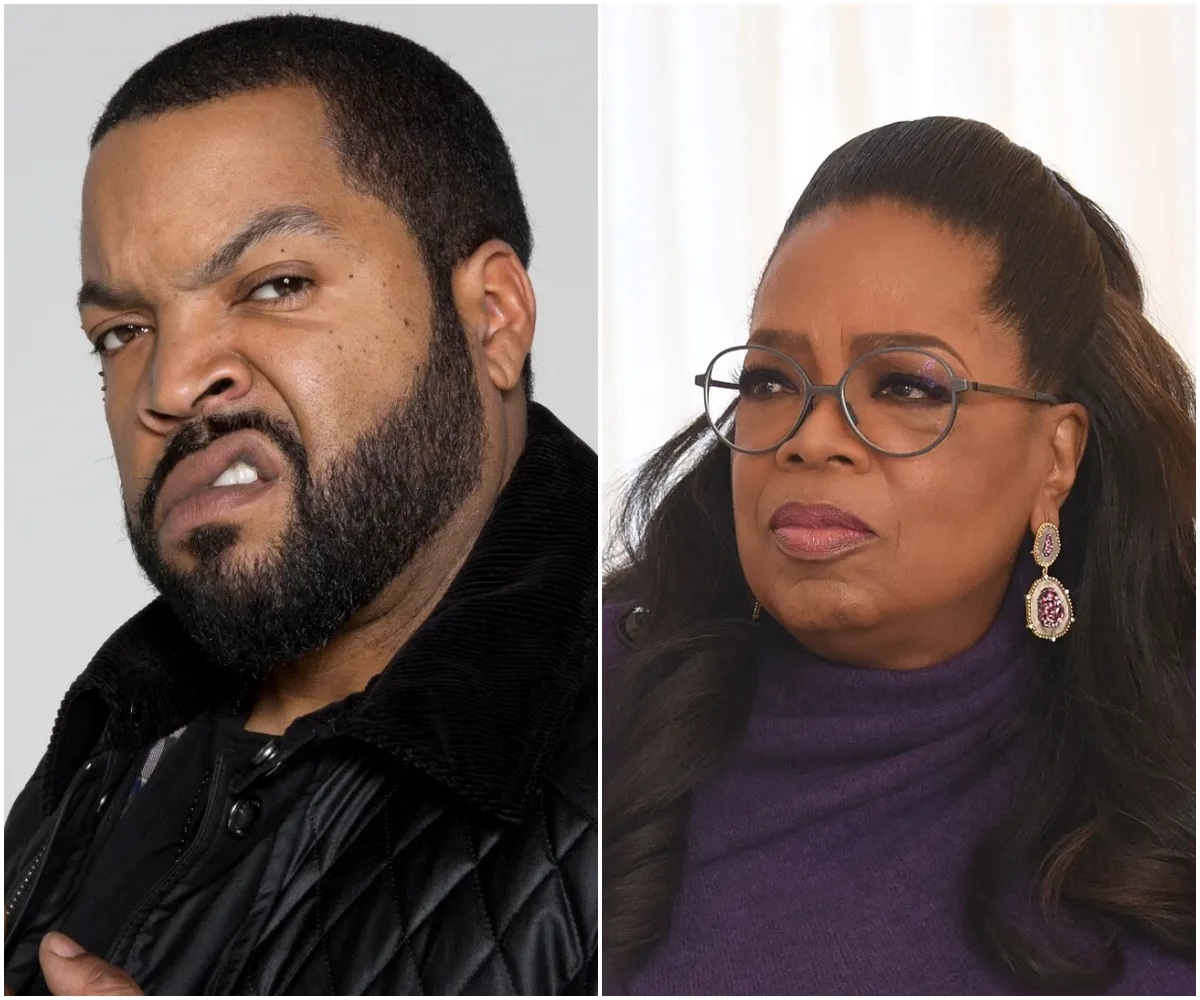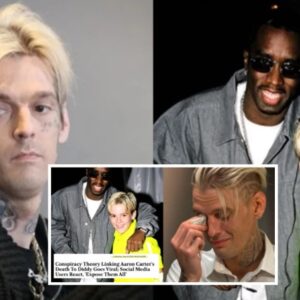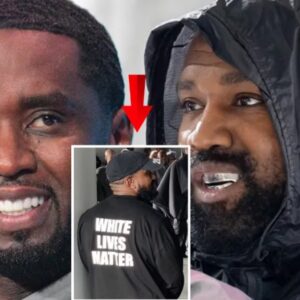In a bold and controversial move, rap icon and actor Ice Cube has publicly called out Oprah Winfrey, accusing her of being a gatekeeper in Hollywood and playing a pivotal role in controlling who gets access to fame, fortune, and success in the entertainment industry. Ice Cube’s claims have reignited discussions about power dynamics, favoritism, and the complex workings of the entertainment industry, specifically focusing on the influence wielded by powerful figures like Oprah.

Ice Cube’s Explosive Allegations
Ice Cube, known for his blunt and unfiltered approach to both music and social issues, has never shied away from speaking truth to power. In his latest statements, he accuses Oprah Winfrey of being a gatekeeper who decides which projects and individuals succeed in Hollywood. According to Ice Cube, this gatekeeping has created a system that controls the flow of opportunities for Black entertainers, making it difficult for those outside Oprah’s circle to thrive.
During a recent interview, Ice Cube laid bare his frustrations with the entertainment industry and Oprah’s role within it. “Oprah has her hands in everything, but it’s not always about helping the Black community rise. It’s about who she chooses to elevate. If you’re not part of that inner circle, you’re left out in the cold,” he said.
The rapper’s comments come at a time when Hollywood is being scrutinized for its lack of diversity and transparency. Ice Cube’s accusations raise questions about whether influential figures like Oprah have a monopoly on deciding who gets to tell their stories and how they are represented in the media.
The Role of Gatekeepers in Hollywood
In the entertainment world, gatekeepers refer to individuals who hold immense influence over what content gets produced, who gets cast, and what stories are told. Oprah Winfrey, with her vast media empire, philanthropic efforts, and Hollywood connections, is one such gatekeeper. Her endorsement can catapult someone to stardom, as seen with many of the authors, actors, and public figures who have appeared on her platforms. However, Ice Cube’s accusation suggests that this power is not always used to benefit the broader Black community or diverse voices.
Oprah has long been celebrated as a pioneer who broke down barriers for Black women in media, but Ice Cube’s remarks suggest there is more complexity to her role. He implies that Oprah’s immense power and influence in Hollywood may be hindering other creatives from getting a fair shot, especially if they don’t align with her values or vision.
“It’s a tight circle, and if you’re not playing the game the way they want you to, you’re out,” Ice Cube continued. “And that’s the problem with Hollywood. You can be talented, you can have the vision, but if you’re not in with the right people, you get locked out.”
Oprah’s Influence in Hollywood
Oprah Winfrey’s influence in Hollywood cannot be overstated. She has built an empire that spans television, film, publishing, and even politics. With her production company Harpo Studios, Oprah has had a hand in producing some of the most iconic and successful films and shows, including The Color Purple, Selma, and her long-running talk show The Oprah Winfrey Show. She has also been a mentor and supporter of rising stars, particularly women of color.
However, Ice Cube’s claims challenge the notion that Oprah’s role in Hollywood has been entirely positive. He implies that the media mogul’s power comes with an agenda, and that she has used her position to dictate who gets ahead and who does not. For those who don’t align with Oprah’s inner circle, Ice Cube suggests that doors remain closed.
Ice Cube also hinted at a larger issue of elitism and exclusivity in Hollywood, where a select few, including Oprah, hold immense control over the careers of countless actors, filmmakers, and creatives.
Public Reaction: Divided Opinions
As expected, Ice Cube’s allegations have stirred up a whirlwind of public debate. Fans and critics alike have taken to social media to express their opinions, with some supporting Ice Cube’s stance and others defending Oprah’s legacy.
On one side, many people have rallied behind Ice Cube’s comments, arguing that Hollywood has long been dominated by gatekeepers who determine who gets a platform and who doesn’t. Some critics of Oprah suggest that she has curated a circle of influence that benefits a select few, often leaving out voices that challenge the status quo.
“Ice Cube is speaking facts,” one Twitter user commented. “Hollywood has always been about who you know, and Oprah’s power is no different. It’s time we start asking whether her influence is helping or hurting the culture.”
However, Oprah’s supporters have been quick to defend her, pointing to her decades of work empowering Black voices and her contributions to media diversity. For many, Oprah represents a beacon of hope and progress in an industry that has historically been exclusionary.
“Oprah has done more for Black actors, filmmakers, and storytellers than almost anyone in Hollywood,” another Twitter user posted. “Ice Cube is wrong to throw her under the bus when she’s done so much to lift others up.”
A Bigger Conversation About Power and Influence
Ice Cube’s criticism of Oprah is not just about one individual—it’s about a larger conversation surrounding the distribution of power in Hollywood. His comments highlight the fact that, even as Hollywood touts its increasing diversity, there are still significant barriers that prevent many from gaining access to the same opportunities.
In calling out Oprah as a gatekeeper, Ice Cube has opened up a dialogue about who gets to hold power and how that power is wielded. Are gatekeepers like Oprah perpetuating a cycle of exclusivity, or are they necessary figures who help elevate marginalized voices? The truth, as with many things in Hollywood, is likely somewhere in between.
For Ice Cube, the issue is clear: too much power in the hands of too few people has created a system where only those who play by certain rules get ahead. He’s not alone in this sentiment. Many up-and-coming actors, writers, and filmmakers have long lamented how difficult it is to break into an industry that seems to be controlled by a small number of insiders.
Conclusion: The Fight for Fairness in Hollywood
Ice Cube’s allegations against Oprah Winfrey have added fuel to an ongoing debate about power, favoritism, and control in Hollywood. While Oprah has undoubtedly opened doors for many, Ice Cube’s claims suggest that those same doors may be closed to others who don’t align with her vision.
As the entertainment industry continues to grapple with calls for diversity and fairness, the role of gatekeepers like Oprah will remain a topic of discussion. Ice Cube’s comments are a reminder that, despite the progress made in recent years, there is still work to be done to ensure that Hollywood is a place where all voices can be heard—not just the ones chosen by those in power.




